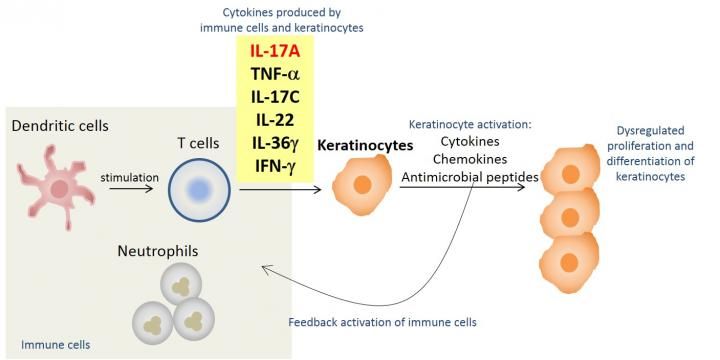Closer to the source of the itch
Advertisement
psoriasis is an inflammatory skin condition that affects some 125 million people worldwide. It is characterized by itchy, scaly skin plaques. The exact cause of psoriasis is unclear. But mounting evidence implicates the immune system in the overproduction of cell-signalling molecules called cytokines, which stimulate skin cells called keratinocytes to express genes that maintain an inflammatory microenvironment. Now, scientists at Hokkaido University in Japan have found more evidence that a cytokine called IL-17A is especially critical in this process.

Psoriasis is a chronic immune-mediated inflammatory disorder. IL-17A and other cytokines act on keratinocytes to activate further inflammatory mediator production, thereby creating an inflammatory loop.
Ryuta MUROMOTO, Hokkaido University
In a previous study published in 2012, researchers treated psoriasis patients with antibodies that attack IL-17A and with a substance, called an antagonist, that acts against tumour necrosis factor, another cytokine strongly implicated in psoriasis. They found that, after two weeks, a much larger set of psoriasis-related genes were suppressed and to a greater magnitude in the patients treated with anti-IL-17A. The researchers concluded that IL-17A is the dominant cytokine involved in the expression of psoriasis-related genes.
The Hokkaido University researchers aimed to reproduce these results in the laboratory. They cultured a single layer of normal keratinocytes with a mixture of six different cytokines known to be involved in psoriasis, and found that it induced the expression of psoriasis-related genes. They then compared the gene expression of these keratinocytes to others treated with various combinations of the same cytokines lacking one cytokine each. When the keratinocytes treated with all six cytokines expressed significantly more genes than one of the lacking combinations, it meant that the lacking cytokine was playing an influential role for the expression of those genes.
Importantly, the team identified a set of psoriasis-related genes in keratinocytes that are regulated by IL-17A. One of these genes in particular, called NFKBIZ, was found to have a significant role in the IL-17A pathway. This gene encodes a protein that plays a well-known role in regulating the body's immune response to infection.
The new study will be useful for furthering the understanding of the IL-17A signaling pathway and how this cytokine interacts with others in the pathogenesis of psoriasis.
Original publication
Other news from the department science
Most read news
More news from our other portals
See the theme worlds for related content
Topic world Antibodies
Antibodies are specialized molecules of our immune system that can specifically recognize and neutralize pathogens or foreign substances. Antibody research in biotech and pharma has recognized this natural defense potential and is working intensively to make it therapeutically useful. From monoclonal antibodies used against cancer or autoimmune diseases to antibody-drug conjugates that specifically transport drugs to disease cells - the possibilities are enormous

Topic world Antibodies
Antibodies are specialized molecules of our immune system that can specifically recognize and neutralize pathogens or foreign substances. Antibody research in biotech and pharma has recognized this natural defense potential and is working intensively to make it therapeutically useful. From monoclonal antibodies used against cancer or autoimmune diseases to antibody-drug conjugates that specifically transport drugs to disease cells - the possibilities are enormous

























































